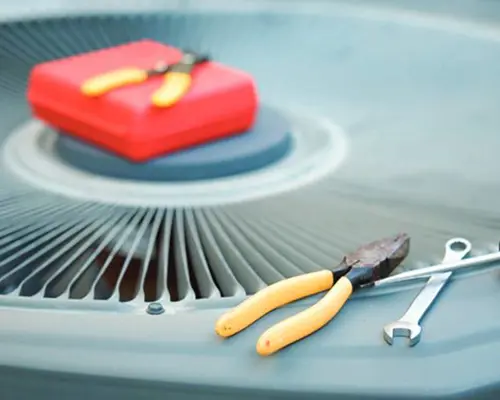
The short answer is: You should turn off your AC unit and unplug it from the power source. If the leak is small, you can try to repair it yourself using a sealant or tape. If the leak is larger, you'll need to call a professional for repairs. Once the leak has been repaired, have your AC unit serviced.
Think your home air conditioning system is leaking freon? The signs of an AC refrigerant leak can often times go unnoticed until you realize your air conditioning has stopped working and you have no cold air traveling through your home.
In this guide, we'll help you understand why AC systems sometimes leak freon and the signs you should watch out for. If your system is suffering from a leak, we'll also explain what steps you should take to stop leaking AC refrigerant and restore your system to proper working order.
What Causes Freon Leaks?
Improper installment:
Freon (also called refrigerant or coolant) is an essential component used in air conditioners—freon aids in phase conversion (when a liquid converts into a gas). Phase conversion helps absorb heat, making your home nice and cold. AC units force a special chemical compound to evaporate and repeatedly condense in a closed system of coils.
Refrigerant leaks occur due to poor installation of some aspects of your HVAC unit. For instance, the most common cause of an AC coolant leak is due to overtightening the flare connections. You should only allow a licensed professional to install your air conditioning system to avoid a freon leak.
If you suspect incorrect installation, some warning signs include:
-
Your system is blowing warm air
-
The thermostat is in the wrong place or does not function properly
-
Poor airflow inside the home
-
Higher electric bills
-
Poor heating
You need to have a local air conditioning repair company inspect your system immediately once you notice any of these signs. If repairs don't fix the issue, you may have one of the other causes below creating drips. You might consider replacing your unit depending on how severe the problem is.
Metal Erosion:
Erosion can cause significant issues in an HVAC system. For example, it creates tiny holes that allow freon leaks. Air conditioning units are typically outdoors, so there's a higher chance of erosion and damage from the elements.
Additionally, formic acid corrodes copper tubes; the thinner the copper lines, the faster they will corrode. If you suspect erosion of copper coils, call a professional as soon as possible for ac repair. Otherwise, you may have to get your whole ac unit replaced if the issue becomes too severe.
Factory Defects:
A common misconception is that when an air conditioning system is new, there won't be any issues if installed correctly. However, there's a possibility of factory flaws with any mass-produced product. Defects can lead to a freon leak in the refrigerant lines over time. Efficiency issues and raised energy bills may indicate that something is amiss.
If you have a new unit with factory deficiencies, you'll need to replace it. This is why it's crucial to have a home appliance warranty. A warranty will assist in fixing or replacing a faulty air conditioner.
Wear and Tear:
Wear and tear are typically found on older units. Because the rubber seals on the valve stems of air conditioning systems tend to wear out over time, it can cause a refrigerant leak. In addition, the outdoor elements may form rust, endure wear and tear, and lead to leaks.
Home appliance insurance can help offset the cost of repairs and complete AC system replacement. An insurance plan may save you a lot of stress and give you peace of mind. Without sufficient insurance or a warranty, you'll pay for everything out of pocket. It may cost over $5,000 to get a unit replaced.
Symptoms of an Air Conditioner Leaking Freon AC Coolant
An air conditioning system uses different items, including an evaporator coil, freon, and coolant. An air conditioner and heat pump need refrigerant to heat or cool a home. The loss of refrigerant can cause your system to fail in reaching the desired set temperature. This causes other issues, including the following:
Longer Cooling Time
Freon leaks make your air conditioning system work harder, especially during the summer months. It will take twice as long for your house to be cool because the unit is not blowing cold air. It's frustrating and makes your home feel unbearably hot.
Higher Utility Bills
A high electric bill can be a sure sign of an ac refrigerant leak. The AC system works harder and uses more energy to keep your house cool. AC freon leaks will lead to thousands of dollars spent on summer energy bills every year.
To save money and resources, you must contact licensed technicians and let them evaluate what is causing your electric bill to skyrocket. If they determine that it's a refrigerant leak causing the air conditioner to use more electricity, they will let you know the best course of action for you to take. Remember, only adding more refrigerant won't completely resolve the underlying problems.
Increased Humidity Indoors
Another clear indication of a freon leak is when your home becomes incredibly humid. When there's not enough refrigerant, you may experience moist conditions that can cause other problems like mold. A unit properly running will produce cool air and keep humidity at bay.
If your house is unusually damp, get an expert to check the refrigerant to ensure there isn't a leak. You need to have the experts find the cause of the leak, fix it, and restore more refrigerants. Trying to restore refrigerant alone won't resolve the underlying cause of the leak. First, find the reason for the leak, then replenish the refrigerant. Otherwise, you'll keep having the same issues.
Hissing Sound at Outdoor Unit
Hissing sounds coming from your AC could indicate something wrong with the compressor. The hiss may signal that your compressor is filling with pressure. You need to call technicians right away if you're experiencing these events, so they can examine your valve and determine if there's excess pressure.
If you hear bubbling sounds and hissing, it's an indication of a freon leak. Let a professional check your unit and your heat pumps to determine where the refrigerant leak is coming from exactly. Never try to look for it yourself because you don't want to expose yourself to toxic gas directly.
Evaporator Coils Are Frozen
Evaporator coils may become frozen due to a coolant or refrigerant leak. Losing refrigerant causes cooling effects that result in a frozen system. Blocked air ducts could also cause an evaporator coil to freeze. Avoid blocked air ducts by keeping airways open and refraining from placing a rug or furniture over vents.
Placing items over vents will trap cool air in the system and keep it from circulating correctly. Covering vents could also lead to heating issues as they won’t quickly transfer heat around the house. Keep vents open if you want both warm air and cool air to flow through properly and avoid causing other problems with your ac unit or heat pump.
Is Leaking Freon Potentially Dangerous?
Refrigerant leaks are detrimental to your health and harmful to the atmosphere. Freon contains toxic chemicals that can affect the air quality and your respiratory system. It's free of taste/ odors and a health hazard that makes your home dangerous. A freon leak may allow harmful gas to escape creating freon poisoning.
Refrigerant poisoning may lead to:
-
Difficulty breathing
-
Nausea
-
Vomiting
-
Headaches
-
Irritated eyes and skin
-
Difficulty breathing
-
Fluid in the lungs
-
Irregular heartbeat
-
Seizures
-
Brain fog
-
Unconsciousness
Seek medical help immediately if you suffer from any of the above symptoms to avoid organ damage or fatality. The dangers above show that air conditioners leaking freon are nothing to ignore.
Can I Top Off My Freon with R410a?
You don't want to top off freon with R410a. They're incompatible because R22 (mineral oil-based) is discordant with R410a (synthetic-based). Combining the two will cause severe damage to your air conditioner or heat pump. Think of it as using synthetic to top off a car that uses regular oil.
R22 refrigerant costs around one hundred dollars per pound. You'll need at least 2-5 lbs for the average unit. Therefore, topping off an R22 air conditioner will be pricey. R22 is becoming more expensive in the U.S. because it has a very high potential to harm the ozone layer. U.S. EPA imposed strict quotas on R22 production to limit its use.
What Should I Do If I Suspect a Freon Leak?
Have a freon leak? Don't attempt to fix the issue on your own, especially for larger leaks. Call ARS/Rescue Rooter for emergency air conditioning repair services and routine AC tune-up service to check for AC refrigerant leaks and keep your unit in top shape. We also replace AC units, other cooling appliances, and heat pumps.
Find your nearest ARS/Rescue Rooter location or give us a call to schedule a AC repair appointment.






